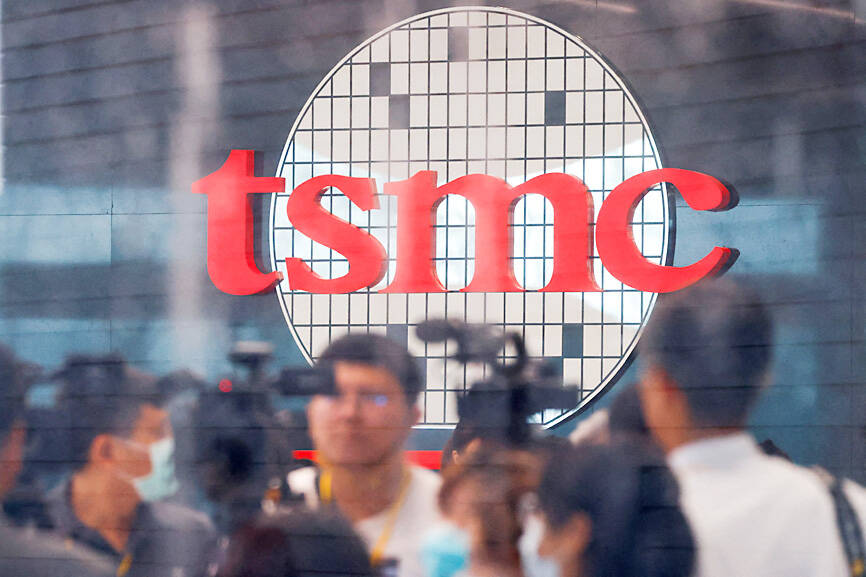The US Department of Commerce said its granting last week of up to US$6.6 billion in subsidies to Taiwan Semiconductor Manufacturing Co (TSMC, 台積電) came after the Taiwanese company pledged to produce chips made using its advanced A16 process.
TSMC Arizona Corp, a subsidiary of the Taiwanese chip giant that handles operations in the state, secured the US government subsidies under the CHIPS Incentives Program’s Funding Opportunity for Commercial Fabrication Facilities after agreeing to bring the state-of-the-art chipmaking technology to the US.
“The advanced chips that TSMC manufactures for its customers — including its A16 technology, which is the most advanced semiconductor technology in the world — are the backbone of central processing units for servers in large-scale datacenters and of specialized graphics processing units used for machine learning,” the department said in a statment.

Photo: Ann Wang, Reuters
TSMC chairman C.C. Wei (魏哲家) was quoted in the statement as saying that the final agreement signed with the department was expected to help the company “accelerate the development of the most advanced semiconductor manufacturing technology available in the US.”
In addition to direct funding of up to US$6.6 billion, the CHIPS Program Office would provide up to US$5 billion of proposed loans — which is part of the US$75 billion of loans authorized by the CHIPS and Science Act — to TSMC Arizona under the award, the department said.
TSMC is building two advanced fabs in Arizona. The first is scheduled to begin mass production of 4-nanometer chips early next year, while the second is slated to commence mass production of 3 and 2-nanometer chips in 2028.
On April 8, when TSMC signed a preliminary non-binding agreement for the subsidies, the company announced its plan to build a third fab in Arizona using its 3-nanometer process or more advanced technology with production slated to begin by the end of 2030, boosting its total investment in Arizona to more than US$65 billion.
The A16 semiconductor process is an improvement on its 2-nanometer process that is on track to begin production next year, TSMC said.
The company’s A16 technology is a next-generation nanosheet-based technology featuring a “super power rail,” which it describes on its Web site as “an innovative, best-in-class backside power delivery solution” that “improves logic density and performance by dedicating front-side routing resource to signals,” TSMC said.
Analysts expect demand for the A16 process to come from high-performance computing suppliers as the boom in artificial intelligence (AI) development continues.
Arisa Liu (劉佩真), a researcher at the Taiwan Institute of Economic Research’s (台灣經濟研究) Taiwan Industry Economics Database, on Monday said that it is possible that TSMC would roll out chips made using its A16 process in its third plant in Arizona.
This would satisfy the US government’s “made in America” initiatives, which aim to bolster domestic supply chains and ultimately reduce the need to spend taxpayer dollars on foreign-made goods, Liu said.
When US president-elect Donald Trump returns to the White House in January, he could demand more from TSMC to narrow the gap between the US and Taiwan in advanced chip development.
Through its investments in the US, TSMC is expected to operate more flexibly at a time of escalating geopolitical unease, she said.
She said she has faith that TSMC would continue to lead its peers in advanced technology development as the company remains highly competitive in terms of chip development used in the artificial intelligence era.

FORCED LABOR: A US court listed three Taiwanese and nine firms based in Taiwan in its indictment, with eight of the companies registered at the same address Nine companies registered in Taiwan, as well as three Taiwanese, on Tuesday were named by the US Department of the Treasury’s Office of Foreign Assets Control (OFAC) as Specially Designated Nationals (SDNs) as a result of a US federal court indictment. The indictment unsealed at the federal court in Brooklyn, New York, said that Chen Zhi (陳志), a dual Cambodian-British national, is being indicted for fraud conspiracy, money laundering and overseeing Prince Holding Group’s forced-labor scam camps in Cambodia. At its peak, the company allegedly made US$30 million per day, court documents showed. The US government has seized Chen’s noncustodial wallet, which contains

SUPPLY CHAIN: Taiwan’s advantages in the drone industry include rapid production capacity that is independent of Chinese-made parts, the economic ministry said The Executive Yuan yesterday approved plans to invest NT$44.2 billion (US$1.44 billion) into domestic production of uncrewed aerial vehicles over the next six years, bringing Taiwan’s output value to more than NT$40 billion by 2030 and making the nation Asia’s democratic hub for the drone supply chain. The proposed budget has NT$33.8 billion in new allocations and NT$10.43 billion in existing funds, the Ministry of Economic Affairs said. Under the new development program, the public sector would purchase nearly 100,000 drones, of which 50,898 would be for civil and government use, while 48,750 would be for national defense, it said. The Ministry of

SENATE RECOMMENDATION: The National Defense Authorization Act encourages the US secretary of defense to invite Taiwan’s navy to participate in the exercises in Hawaii The US Senate on Thursday last week passed the National Defense Authorization Act (NDAA) for Fiscal Year 2026, which strongly encourages the US secretary of defense to invite Taiwan’s naval forces to participate in the Rim of the Pacific (RIMPAC) exercise, as well as allocating military aid of US$1 billion for Taiwan. The bill, which authorizes appropriations for the military activities of the US Department of Defense, military construction and other purposes, passed with 77 votes in support and 20 against. While the NDAA authorizes about US$925 billion of defense spending, the Central News Agency yesterday reported that an aide of US

NINE-IN-ONE ELECTIONS: Prosecutors’ offices recorded 115 cases of alleged foreign interference in the presidential election campaign from August 2023 to Dec. 13 last year The National Security Bureau (NSB) yesterday said that it has begun planning early to counter Chinese interference in next year’s nine-in-one elections as its intelligence shows that Beijing might intensify its tactics, while warning of continued efforts to infiltrate the government and military. The bureau submitted a report to the Legislative Yuan ahead of a meeting today of the Foreign Affairs and National Defense Committee. “We will research situations in different localities and keep track of abnormalities to ensure that next year’s elections proceed without disruption,” the bureau said. Although the project is generally launched during election years, reports of alleged Chinese interference